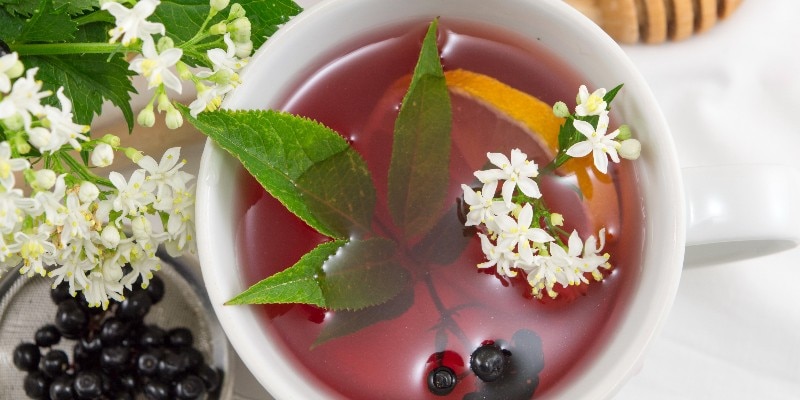by Melissa Chichester
Elderberry — a small shrub that grows throughout Europe and the United States — has surpassed echinacea in recent years as the go-to traditional immune-supporting herb.* But what makes elderberry so effective? Part of the answer is the abundance of nutrients in elderberries, such as Vitamin C and Vitamin A, which act as antioxidants. The other key is the flavonoids found in elderberries, including anthocyanins, quercetin, and rutin.
Flavonoids are phytonutrients — chemicals found in plants — that create the beautiful rainbow of colors that fruits, vegetables, and flowers sport. Flavonoids are the largest class of plant chemicals. They can be broken down further into other groups and subgroups.
Elderberries are a deep reddish-purple color, almost appearing black. Anthocyanins are flavonoids that contribute to their color. Present in other dark berries, such as blueberries, cranberries, bilberries, and raspberries, anthocyanins are typically found in the outer cell layers of these berries.
Another flavonoid found in elderberries is quercetin, which is available through many foods. It also has beneficial antioxidant properties.* Quercetin is a yellow color and found in foods such as leafy green vegetables, onions, broccoli, apples, cherries, and other dark berries. Quercetin is also found in green tea and red wine.
Rutin is available on its own as a dietary supplement for people who cannot tolerate rose hips or ascorbic acid. Rutin is a yellow-green pigment found in many plant parts, including the skin, leaves, roots, and flowers. In citrus fruits, rutin is usually found in the rind. Other foods with high concentrations of rutin include grapes, buckwheat, asparagus, apples, figs, and berries, like elderberry.
>>8 Perfectly Purple Fruits and Vegetables to Add to Your Diet

In addition to elderberry supplements, drinking elderberry tea is a great way to receive its benefits. Elderberries can be difficult to purchase in person; however, dried elderberries and liquid elderberry extract can be found at many online retailers.
This tea is easy to make, nutritious, and the perfect way to start your healthy day.
Place elderberries, water, and cinnamon into a pot. Bring water to a boil, then reduce heat and cover the pot. Let simmer for 20 minutes. Strain out the berries, remove the cinnamon stick, and sweeten with raw honey or stevia if desired. Enjoy!